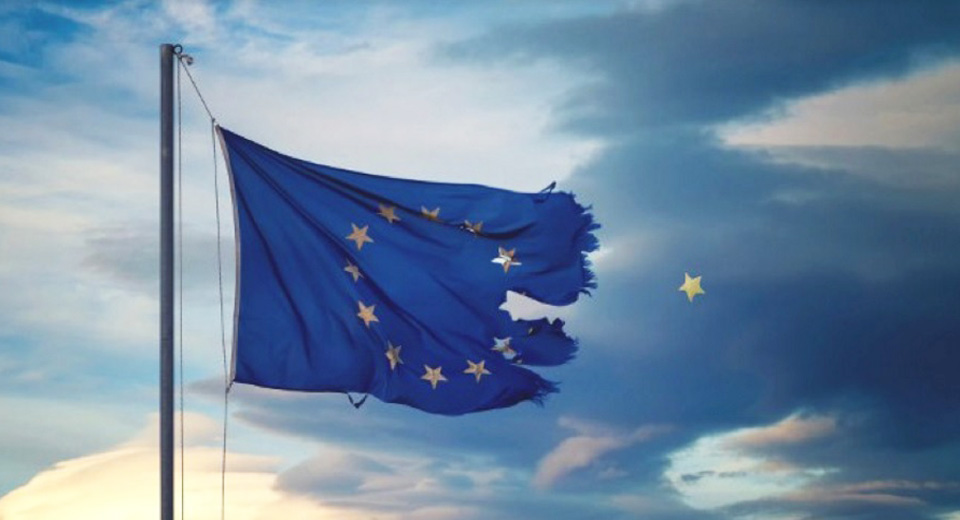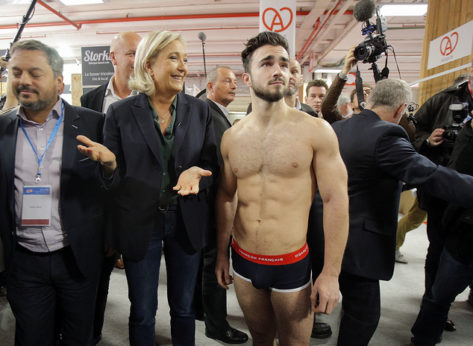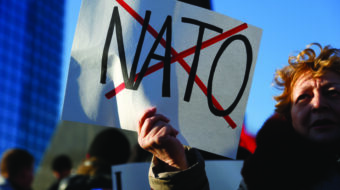
Going in to the recent elections in the Netherlands, the mainstream story seemed lifted from William Butler Yeats poem, The Second Coming:
“Things fall apart; the center cannot hold,
The best lack all conviction,
While the worst are full of passionate intensity.”
The right was on the march, the left at war with itself, the traditional parties adrift, and the barbarians were hammering at the gates of the European Union.
It’s a grand image, a sort of politics as the Game of Thrones, but the reality is considerably more complex. There is, of course, some truth in the apocalyptic imagery: right-wing parties in the Netherlands, France, and Germany have grown. There are indeed some sharp divisions among left parties. And many Europeans are pretty unhappy with those that have inflicted them with austerity policies that have tanked living standards for all but a sliver of the elite.
But there are other narratives at work in Europe these days besides an HBO mega series about blood, war, and treachery.
Netherlands: The Islamophobes falter
The recent election in the Netherlands is a case in point. After holding a lead over all the other parties, Geert Wilders’ right-wing, racist Party for Freedom (PVV) faltered. In the end, his Islamophobes did not break the gates (but they did pick up five more seats). Overall, it was a victory for the center, but it was also a warning for those who advocate “staying the course” politics and, most pointedly, a reminder of the consequences of abandoning principles for power.
The Left Greens did quite well by taking on Wilders’ anti-Islam agenda and challenging Prime Minister Mark Rutte’s center-right Popular Party for Freedom and Democracy (VVD) on the economic front. In one national debate, Jesse Klaver, the Left Green’s dynamic leader, argued that janitors should be paid more and bankers less. The election, he said, is not about “Islam and Muslims,” but about “housing, income and health care.” The voters clearly bought it.
Rutte’s coalition partner, the center-left Labour Party, was crushed, losing 29 seats. For the past four years, Labour has gone along with Rutte’s program of raising the retirement age and cutting back social spending, and voters punished them for shelving their progressive politics for a seat at the table.
The VVD also lost eight seats, which probably went to centrist parties like Democrats66, suggesting that Rutte’s “business as usual” is not what voters want either. VVD is still, however, the number one party in the 150-seat parliament.
There were some lessons from the Dutch elections, though not the simplistic one that the “populist” barbarians lost to the “reasonable” center. What it mainly demonstrated is that voters are unhappy with the current situation, they are looking for answers, and parties on the left and center-left should think carefully about joining governments that think it “reasonable” to impoverish their own people.
France: Nationalists in the lead
Next up in the election docket is France, where polls show Marine Le Pen’s neo-Nazi National Front leading the pack in a five-way race with traditional right-wing candidate François Fillon, centrist and former Socialist Party member Emmanuel Macron, Socialist Party candidate Benoît Hamon, and leftist Jean-Luc Mélenchon. The first round, scheduled for April 23, will eliminate all but the two top vote getters. A final round will be held May 7.

With Mélenchon and Hamon running at 11.5 percent and 13.5 percent respectively, thus splitting the left vote, the race appears to be between Fillon, Macron, and Le Pen, with the latter polling slightly ahead of Macron and considerably better than Fillon.
If you are attracted to the apocalypse analogy, France is probably your ticket.
Le Pen is running a campaign aimed against anyone who doesn’t look like Charlemagne or Joan of Arc, but her strong anti-EU positions play well with young people, in small towns, and among rural inhabitants. All three groups have been left behind by the EU’s globalist policies that have resulted in de-industrialization and growing economic inequality. Polls indicate she commands 39 percent of 18 to 24 year olds, compared with 21 percent for Macron and 21 percent for Fillon.
Fillon has been wounded by the revelation that he has been using public funds to pay family members some $850,000 for work they never did. But even before the scandal, his social conservatism played poorly with the young, and workers are alienated by his economic strategy that harkens back to those of British Prime Minister Margret Thatcher, whom he greatly admires. His programs sound much like Donald Trump’s: cut jobless benefits and social services, lay off public workers, and give tax cuts to the wealthy.
Macron, an ex-Rothschild banker and former minister of economics under current president Hollande, is running neck-and-neck with Le Pen under the slogan “En Marche” (“On Our Way”), compelling critics on the left to ask “to what?”. His platform is a mix of fiscal discipline and mild economic stimulation, and he is young, 39, telegenic, and a good speaker. But his policies are vague, and it is not clear they have much substance to them.
Most polls indicate a Le Pen vs. Macron runoff, with Macron coming out on top, but that may be dangerous thinking. Macron’s support is soft. Only about 50 percent of those who say they intend to vote for him are “certain” of their vote. In comparison, 80 percent of Le Pen’s voters are “certain” they will vote for her.
There are, as well, some disturbing polling indications for the second round. According to the IFOP poll, some 38 percent of Fillon’s supporters say they will jump to Le Pen – two million voters – and 7 percent of Hamon voters and 11 percent of Mélenchon backers would shift to Le Pen as well. What may be the most disturbing number, however, is that 45 percent of Mélenchon voters say they will not vote if Macron is the candidate. Some 26 percent of Fillon’s voters and 21 percent of Hamon’s votes would similarly abstain.
Le Pen will need at least 15 million votes to win – the National Front has never won more than six million nationally – but if turnout is low, Le Pen’s strongly motivated voters could put her into the Élysée Palace. In this way, France most resembles Britain prior to the Brexit vote.
If that comes to pass, Le Pen will push for a national referendum on the EU. There is no guarantee the French will vote to stay in the Union, and if they leave, that will be the huge trade organization’s death knell. The EU can get along without Britain, but it could not survive a “Frexit.”
Germany: A nationwide red-red-green alliance?
Germany will hold national elections Sept. 24, but the story there is very different than the one playing out in France. The government is currently a grand coalition between Chancellor Angela Merkel’s conservative Christian Democratic Union (CDU), the Bavarian-based Christian Social Union (CSU), and the center-left Social Democrats (SPD). The alliance has been a disaster for the SPD, which at one point saw its poll numbers slip below 20 percent.
But German politics has suddenly shifted. On Merkel’s left, the Social Democrats changed leaders and have broken with industrial policies that have driven down the wages of German workers in order to make the country an export juggernaut. On the Chancellor’s right, the racist, neo-Nazi Alternative for Germany (AfG) has drained CDU and CSU voters with proposals to ban immigration and withdraw from the EU, although the Alternative is dropping in the polls as of late.

The game changer has been the sudden popularity of former EU President Martin Schultz, the new leader of the Social Democrats. The SPD is now neck-and-neck with the CDU/CSU front, and some polls show Schultz actually defeating Merkel. In terms of personal popularity, Schultz is now running 16 points ahead of Merkel. While the Chancellor’s CDU/CSU alliance still tops the polls at 34 percent, the Social Democrats are pulling in 32 percent and climbing.
Schultz has made considerable headway critiquing declining living standards. Germany has large numbers of poorly paid workers, and almost 20 percent of workers age 25 to 34 are on insecure, short-term contracts. Unemployment benefits have also been cut back, even though Germany’s economy is the most robust in Europe and the country has a $310 billion surplus.
In any case, the days when Merkel could comfortably count on 40 percent of the vote are gone. Even if her coalition comes in number one, it may not have enough seats to govern, even if its traditional allies, the Free Democrats, make it back into the Bundestag.
That creates the possibility of the first so-called “red-red-green” national government of the SPD, the left-wing Die Linke Party, and the Green Party. Die Linke and the Greens are both polling at around 8 percent. Such an alliance currently runs several major cities, including Berlin. It would not be an entirely comfortable united front: the SPD and the Greens are pro-EU, while Die Linke is highly critical of the organization.
But there is a model out there that gives hope.
Portugal is currently run by a three-party center-left to left alliance. Those parties also disagree on things like the EU, the debt, and NATO membership, but for the time being, they have decided that stimulating the economy and easing the burden of almost a decade of austerity trumps the disagreements.
Italy: Government by comedian?
And then there are the Italians.
While Italy has not scheduled elections, the defeat of Democratic Party leader and then Prime Minister Matteo Renzi’s recent constitutional referendum almost guarantees a vote sometime in the next six months.
Italy has one of the more dysfunctional economies in the EU, with one of the Union’s highest debt ratios and several major banks in deep trouble. It is the EU’s third largest economy, but growth is anemic and unemployment stubbornly high, particularly among the young.
Renzi’s center-left Democratic Party (PD) still tops the polls, but only just, and it has fallen nearly 15 points in two years. Nipping at its heels is the somewhat bizarre Five Star Movement party run by comedian Beppe Grillo, whose politics are, well, odd. Five Star is strongly opposed to the EU and allies itself with several right-wing parties in the European Parliament. It applauded the election of Donald Trump. On the other hand, it has a platform with many progressive planks, including economic stimulation, increased social services, a guaranteed income for poor Italians, and government transparency. It is also critical of NATO.
Five Star has recently taken a few poll hits, because the party’s Mayor of Rome has done a poor job keeping the big, sprawling city running – in truth, the ancient Romans found it a daunting task – and is caught up in a financial scandal. Some Democratic Party leaders are also being investigated for corruption.
The only other major parties in the mix are former Prime Minister Silvio Berlusconi’s center-right Forza Italia, which is polling around 13 percent, and the racist, xenophobic Northern League at 11.5 percent. The latter, which is based the northern Po Valley, made a recent effort to broaden its base by taking its campaign to Naples in southern Italy. The result was a riot with protestors tossing rocks, bottles, and Molotov cocktails at Northern League leader Matteo Salvini.
There are informal talks going on about uniting the parties. Berlusconi has worked with the Northern League in the past.
There is also a gaggle of smaller parties in the parliament, ranging from the Left Ecology/Greens to the Brothers of Italy, none registering over 5 percent. But since whoever comes out on top will need to form a coalition, even small parties will likely punch above their weight.
If Five Star does come in first and patches together a government, it will press for a referendum on the EU, and there is no guarantee that Italians – battered by the austerity policies of the big trade group – won’t decide to bail like the British did. An “Italexit,” like the potential “Frexit” mentioned above, would probably be a fatal blow to the EU.
A “New Deal” for Europe
Predicting election outcomes is tricky these days, Brexit and the election of Donald Trump being cases in point. The most volatile of upcoming ballots are in France and Italy. Germany’s will certainly be important, but, even if Merkel survives, the center-right will be much diminished and the left will be stronger. And that will have EU-wide implications.
The European left is divided, but not all divisions are unhealthy, and a robust debate is not a bad thing. None of the problems Europe faces are simple. Is the EU salvageable? What are the alternatives to austerity? How do you tackle growing inequality and the marginalization of whole sections of society? How do you avoid the debt trap facing many countries, blocked by the EU’s economic strictures from pursuing any strategy other than more austerity?
In a recent interview, Yanis Varoufakis, former Greek finance minister under the Syriza government and one of the founders of the liberal-left front organization DiEM25, proposed a “New Deal” for Europe, where in “All Europeans should enjoy in their home country the right to a job paying a living wage, decent housing, high-quality health care and education, and a clean environment.”
The “Deal” has five goals that Varoufakis argues can be accomplished under the EU’s current rules and without centering more power in Brussels at the expense of democracy and sovereignty. These would include: “large-scale” investment in green technology; guaranteed employment with a living wage; an EU-wide anti-poverty fund; a universal basic income, and anti-eviction protection policies on housing.
None of those goals will be easy to achieve, but neither can Europe continue on its current path. The right-wing “populists” may lose an election, but they aren’t going away.
Almost 40 years ago, British Prime Minister Margaret Thatcher launched her neoliberal assault on trade union rights, health care, education, and social services with the slogan, “There is no alternative.” The world is still harvesting the bitter fruits of those years and the tides of hatred and anger they unleashed. It is what put Trump into the Oval Office and Le Pen within reach of the French presidency.
But there is an alternative, and it starts with the simple idea of the greatest good for the greatest number.
Conn Hallinan’s writings are available at his blog, Dispatches from the Edge.












Comments